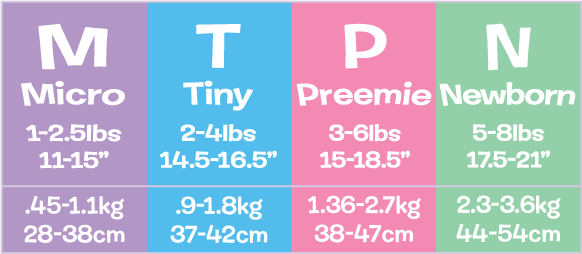We had the pleasure of sitting down with Eric Ruthford, a father of a micro preemie and author. Eric was kind enough to take time away from his crazy schedule to talk to us a little bit about prematurity and preemies in honor of prematurity awareness month.
I’m excited to talk you you about preemies!
Tell us a little bit about premature birth.
Premature birth means a baby born before 37 weeks of gestation are completed. There’s all sorts of health problems that can occur when a child is premature, and it is one of the leading causes of infant mortality. In the United States, 12.5 percent of births are premature. For us as parents, it was an awful shock to wondering if we wanted to have a baby shower in a couple months to having the baby suddenly there and in serious danger.
What is the difference between a preemie and a micro preemie?
A micropreemie is a child born at less than 800 grams weight, or one pound, 12 ounces, and is at severe risk of lung problems, brain bleeds, and digestive problems. A preemie is any child born early. A preemie born a week or two early might need a few days of monitoring at the hospital after birth, but is generally considered to be at much lower risk for complications. Our son, Gabriel was a micropreemie, born at 652 grams.
Are there different things that babies will have to go through depending on how early they are born?
When Gabriel was born at 22 weeks and 6 days of gestation, the doctors gave him dopamine to keep his blood pressure up, and he had to get blood transfusions. He wasn’t having any particular problem, it’s just quite difficult for a baby to do basic things like making and circulating blood at that age. He also had a breathing tube put down his throat because breathing was too much work for him. A preemie born at 28 or 30 weeks of gestation would be less likely to go through all that. Also, preemies born that early are at high risk for bleeding in their brains, which can cause cerebal palsy or mental retardation later.

How long are preemies considered to be premature?
Every time we made it another week in the NICU, I kept thinking “Now that we’re at the equivalent of 26 weeks, does that mean Gabriel is a 26-weeker in terms of his needs?” I asked the nurses this a few times, and the answer was no. His 22-week preemie issues stuck with him for a while, and the neighbor babies born at 28 weeks or 30 weeks got to leave far, far sooner than Gabriel. Pediatricians consider two years of age the point where they’re supposed to have caught up with their peers. I don’t really think that’s fair, but it’s how they look at the clinical indicators.
How was your experience in the NICU?
Long. We were there for 5 months. It was a trying experience, going there every day, sitting in that cramped space, being unable to be the primary caregiver for the child. But, we were happy with the car that he got.
Is there a typical amount of time a baby will stay in the NICU?
It depends on the baby’s level of immaturity. For a baby Gabriel’s age, it could be a pretty short stay, because most babies don’t survive. But a 32-weeker without major complications could get home in a month or two.

What were you worried about most?
He started out with about 14 issues to deal with, from his heart, to his lungs, to his kidneys. As he matured, a number of them just went away. I suppose the thing that worried us most was necrotizing enterocolitis, which is when a portion of the bowel dies and toxins go through the body, making a healthy child go from looking fine to very sick in just a few hours. About 10 percent of preemies get that disease, and it often happens after several weeks of encouraging growth in the NICU.
What are parents allowed to bring into the NICU?
At our NICU, we were allowed to bring cameras, pictures to tape on the windows of his isolette. We had a limit of two adults by the isolette at any one time. We could have brought clothes for him, but we just let the nurses use the outfits in their supply.
Any tips for helping parents bond with their baby in the NICU?
Show up. For mothers, use a breast pump and bring in the breast milk as that helps reduce the risk of necrotizing enterocolitis by a great deal. For Dads, when it comes time for the baby to learn to nipple, it will be helpful for him to do bottle feeding that time as babies often perform better on the bottle for Dads than Moms. (The baby knows that there’s direct breastmilk available from Mom, and often doesn’t work as hard for her.) Also, kangaroo care, or skin-to-skin time, is important.

Did you ever receive a care package in the NICU, did you find it helpful?
Our church had work parties to make sandwiches for us that could be frozen. That was helpful when we got sick of restaurant food. I think the March of Dimes or a similar organization provided us a bag of other items, but it’s been a while and I don’t remember all the details.
Explain what Early intervention is and why parents of preemies should know about it.
Early intervention means after babies leave the NICU, getting them in to therapy or other treatment to help them catch up with their term-baby peers as regards physical abilities, speech abilities and social abilities. The hope is that extra exercises and activities will help them catch up while their brains are still rapidly developing, rather than have it become a long-term special need.
What do you suggest for parents who are having feeding issues with their baby?
I would say first that parents need to have patience and remember that it is not their fault that the baby won’t eat. It’s so easy to take the attitude that that baby needs a certain amount of food loaded in to him and parents get too aggressive. A feeding therapist can be a great help in suggesting different bottles, feeding positions, games to play during feeding, and how to watch for oral aversion, which is when the baby hates having anything put in his mouth.

How do you cope with the worry and fear during the NICU process?
The main part of the parent’s experience in the NICU is just showing up. It’s an especially strange place to be because there’s actually very little that you can do for your child while in the NICU, but showing up, being present, and listening to the nurses’ and doctors’ explanations of your baby’s condition is the thing that you can do. But beyond that, there isn’t much to do with the worry and the fear than just be worried and be afraid. Your child is at terrible risk of death and other kinds of problems, and there’s nothing you can do about it.
What are typical preemie issues?
For preemies as young as Gabriel, the big issue is respiratory distress syndrome, which virtually all of them get because their lungs are not developed enough to breathe on their own. This is caused by lack of surfactant, a substance that allows lungs to inflate and deflate easily. Other big issues are brain bleeds that can lead to cerebal palsy, gastrointestinal problems that make it difficult to eat, and the ever-present danger of infections that their immune systems are not able to deal with.
Do children typically get over these issues by a certain age?
The last NICU reunion that I attended had kids that showed a full spectrum of recovery. There were children running and jumping who looked like the kids you’d see on any neighborhood playground, and there were kids in wheelchairs with breathing tubes directly in to their necks that could be plugged in for additional oxygen. At the age of 2, doctors stop making corrections for a preemie’s development, that is to say that when they look at a child’s height and weight, they compare it to the growth curve and say “Your child isn’t really 12 months old, let’s compare him to 9-month-olds.” At 2, they stop doing that, which puts them at a bit of a disadvantage.
How important do you think it is for parents of preemies to find support?
Parents do need to find support with therapists for their children to get them caught up before a rude awakening when they get to kindergarten. They also need to connect with other preemie parents so that there are people who understand why there’s all these special tubes and additional doctors’ appointments without thinking that there’s something wrong with the child.
About Eric
For more information about Eric and to find out updates on his book follow him on Twitter






